Latest News
-
Anti-terrorism Bill will be changedThe highly controversial Antiterrorism Bill is subject to amendments and changes in Parliament and as such no one should have any fear or feeling of threat from the proposed Bill, Justice Minister Dr. Wijeyadasa Rajapakshe said. The government is aware of concerns raised by the global and local community on certain provisions contained in the draft of the Anti-terrorism Bill and the Government is ready to alleviate them by discussion, compromise and flexibility, he added. Addressing a news conference at the Information Department auditorium, Minister Rajapakshe said the Prevention of Terrorism Act (PTA) passed in 1979 under President J.R. Jayewardene’s rule as a temporary measure to counter the emerging separatist insurgency. The PTA has been misused and exploited by successive Governments since then for their personal and political...Read More...
-
WhatsApp adds option to use the same account on multiple phonesWhatsApp users are no longer restricted to using their account on just a single phone. Today, the Meta-owned messaging service is announcing that its multi-device feature — which previously allowed you to access and send messages from additional Android tablets, browsers, or computers alongside your primary phone — is expanding to support additional smartphones. “One WhatsApp account, now across multiple phones” is how the service describes the feature, which it says is rolling out to everyone in the coming weeks.
Setting up a secondary phone to use with your WhatsApp account happens after doing a fresh install of the app. Except, rather than entering your phone number during setup and logging in as usual, you instead tap a new “link to existing account” option. This will generate a QR...Read More... -
CBK commends Dr. Shafi’s noble gesture of donating past salary to buy essential medicineFalsely accused by racist elements for alleged illegal sterilisation, Kurunegala Teaching Hospital doctor says racism will not take country or organisation forward except make poor people suffer more; calls on all to make Sri Lanka racism-free Former President Chandrika Bandaranaike Kumaratunga has commended Dr. Mohamed Shafi Shihabdeen over his gesture of donating the past salaries amounting to Rs. 2.6 million during his suspension and imprisonment on false charges to buy essential medicines. Chandrika Bandaranaike Kumaratunga
Dr. Mohamed Shafi Shihabdeen
Following...Read More... -
Dr. Shafi donates arrears of his salary to purchase medicines for hospitalsDr. Shihabdeen Mohamed Shafi, the doctor at the Kurunegala Teaching Hospital has decided to donate arrears of his salary amounting over Rs. 2.67 million for the purchase of essential medicines for hospitals.
Dr. Shafi who was on compulsory leave on charges of performing infertility surgery, has received a cheque of over Rs. 2.67 million salary arrears from the Health Ministry last week.
The salary arrears include the basic salary, interim allowance, cost of living, and allowance in lieu of pension for the period of compulsory leave imposed on Dr. Sihabdeen.
Dr. Shafi who was employed at the Kurunegala teaching hospital was arrested on May 25th, 2019, on charges of performing infertility surgery.
On July 25, 2019, the Kurunegala Magistrate’s Court ordered that the doctor be released on bail.Read More...Govt. used Sinhala-Buddhist shield to its maximum benefit Ven. Galkande Dhammananda TheraThis Govt. nurtured thug-like monks promoted them and deployed them in various places Certain monks have severe psychological wounds If society isn’t healed cases of domestic violence, harassment and child abuse will be on the rise Reconciliation was about having workshops, providing a report and earning dollars Accountability has not been included in the Constitution or the Judicial system Terrorism sprouts in a country that has no justice Ven. Galkande Dhammananda Thera who currently heads the Walpola Rahula Institute for Buddhist Studies has been addressing issues related to social justice and harmony while promoting an inclusive and plural society. Having gathered a wealth of experience during the height of war for instance and having encountered various incidents during his lifetime, Ven. Dhammananda Thera has...Read More...Health ministry to pay back-wages for Dr. Shafi before July 10The Ministry of Health today gave an undertaking before the Court of Appeal that the salary and allowances payable to Dr. Shafi Shihabdeen will be paid before July 10 this year. The Ministry of Health gave this undertaking pursuant to a writ petition filed by Dr. Shafi Shihabdeen, who was at the centre of the controversy surrounding the alleged sterilisation of female patients. The Director General of Establishment at the Ministry of Public Services had earlier informed the Court that the basic salary, interim allowance, cost of living and allowance in lieu of pension could be paid to Dr. Shafi Shihabdeen, for the compulsory leave period. Meanwhile, the petitioner expressed willingness to attend the preliminary inquiry before Director of Kurunegala Teaching Hospital Dr. Chandana Kendangamuwa. Taking into consideration the facts,...Read More...Sri Lanka court orders release of lawyer held for two yearsA Sri Lankan court has ordered the release on bail of a lawyer arrested over his alleged links to the 2019 Easter Sunday bombings and held for nearly two years on charges rights groups say lacked credible evidence. Hejaaz Hizbullah was arrested in April 2020 and accused of being linked to the attacks on churches and hotels that left 279 people dead. But after prosecutors failed to provide evidence of his involvement in the attacks, blamed on a local group, he was instead Read More...Hejaaz Hizbullah leaves from remand custodyAttorney-at-law Hejaaz Hizbullah today left from remand custody after fulfilling his bail conditions before Puttlalam High Court.Read More...
He was incarcerated for 22 months for allegedly committing offences come under the Prevention of Terrorism Act.Last Monday (07), the Court of Appeal ordered to release Hizbullah on bail pursuant to a revision application filed on behalf him.Hizbullah was ordered to be released on a cash bail of Rs.100,000 with two sureties of Rs.500,000 by Puttlalam High Court Judge Kumari Abeyratne. He was further ordered to report to the DIG office of Puttalam Police Division every second and fourth Sunday of every month.An indictment under the Prevention of Terrorism Act and the International Covenant on Civil and Political Rights (ICCPR) Act has now been served on Hejaaz Hizbullah. According to the indictment, Hizbullah...හිජාස් ගෙදර යයි
(නිමන්ති රණසිංහ සහ හිරාන් ප්රියංකර ජයසිංහ) ත්රස්තවාදය වැළැක්වීමේ පනත සහ සිවිල් හා දේශපාලන අයිතීන් පිළිබද ජාත්යන්තර සම්මුති පනත ප්රකාරව චෝදනා ලැබ වසර දෙකකට ආසන්න කාලයක් රක්ෂිත බන්ධනාගාර ගත කර සිටි නිතීඥ හිජාස් හිස්බුල්ලා මහතා අභියාචනාධිකරණ නියෝගය ප්රකාරව ඇප මත මුදාහැරීමට පුත්තලම මහාධිකරණය අද (09)...Read More...Court of Appeal grants bail on Hejaaz HizbullahThe Court of Appeal today ordered to release Attorney-at-law Hejaaz Hizbullah on bail after nearly two years in detention and remand custody. Accordingly, the Court of Appeal directed the Puttalam High Court to release Hejaaz Hizbullah on bail with suitable bail conditions. The Court of Appeal two-judge-bench comprising Justice Menaka Wijesundera and Justice Neil Iddawala made this order taking into consideration a revision application filed on behalf of Hejaaz Hizbullah. The Attorney General did not raise objections to release Hizbullah on bail. On January 28, an application made by the defence requesting to release Attorney-at-law Hejaaz Hizbullah on bail was rejected by Puttalam High Court. The High Court Judge Kumari Abeyrathne refused to grant bail citing that she has no jurisdiction to grant bail under the Prevention of Terrorism...Read More...- 1
- 2
- 3
- 4
- 5
- 6
- 7
- 8
- 9
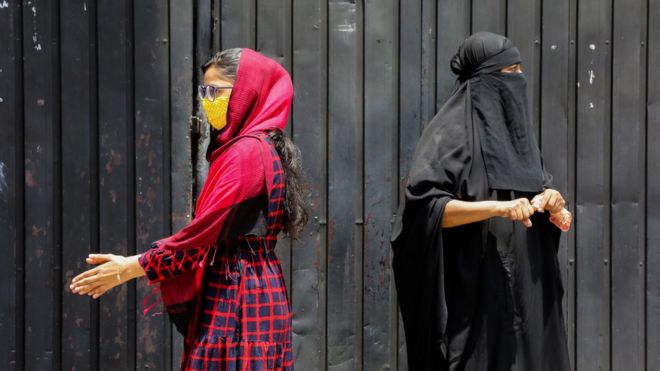
Image copyrightEPA
Image captionSri Lankan Muslim women wait for a Covid-19 test. Some in the community are fighting cremation rules
Sri Lankan authorities are insisting on cremation for coronavirus victims - a practice forbidden by Islam. The nation's minority Muslim community says they are using the pandemic to discriminate, writes BBC Sinhala's Saroj Pathirana.
On 4 May, Fathima Rinoza, a 44-year-old mother of three from Sri Lanka's minority Muslim population, was admitted to hospital with a suspected case of Covid-19.
Fathima, who lived in the Sri Lankan capital, Colombo, had been suffering from respiratory problems and the authorities feared she had caught the virus.
On the day she was admitted to hospital, the family was "set upon" by the authorities, her husband Mohamed Shafeek said.
"The police and military along with officials arrived at our door," he said. "We were kicked out and they sprayed [disinfectant] everywhere. We were all scared but they didn't tell us anything. Even a three-month-old baby was tested and they took us like dogs to the quarantine centre."
The family was held for a night but released the next day and told to quarantine for two weeks, Mohamed said. By then, they had received news that Fathima had died, at the hospital, on her own.
Fathima's adult son was asked to go to the hospital to identify his mother's body. He was told that her body could not be returned to the family, he said, as her death was linked to Covid-19.
Instead he was forced to sign papers authorising her cremation, the family said - even though under Muslim law cremation is considered a violation of the human body.
"He was told that her body parts needed to be removed for further tests. Why would they need body parts if she had corona?" said his father Shafeek, who feels the family were not fully informed about what happened.
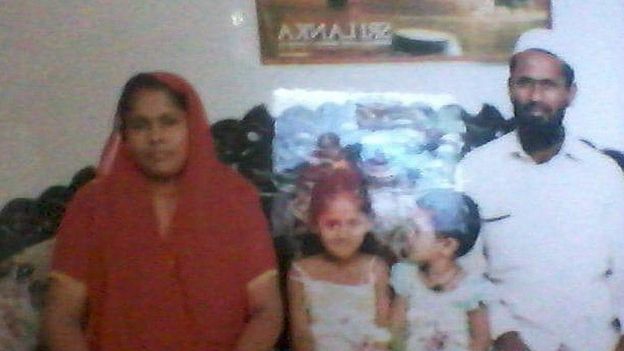 Image copyrightMOHAMED SHAFEEKImage captionFathima and her husband Mohamed with their two daughters
Image copyrightMOHAMED SHAFEEKImage captionFathima and her husband Mohamed with their two daughters
Fathima's family and others in Sri Lanka's Muslim community say the authorities are violating their rights by forcing them to cremate victims even though coronavirus victims can be buried.
They argue it's the latest step in a pattern of discrimination by the majority Sinhalese population. A petition against the cremation rule has been accepted by the country's Supreme Court, which will begin hearing the case on 13 July.
Many Muslims in Sri Lanka feel they have been demonised since April 2019, when Islamists linked to little-known local groups targeted high-end hotels and churches in Colombo and in the east of the country, killing more than 250 people in a spate of devastating attacks.
Since the death of the first Sri Lankan Muslim from coronavirus on 31 March, some media outlets have openly blamed the Muslim community for spreading the disease, even though only 11 deaths have been officially recorded in the country.
All 11 bodies, including Muslims, were cremated.
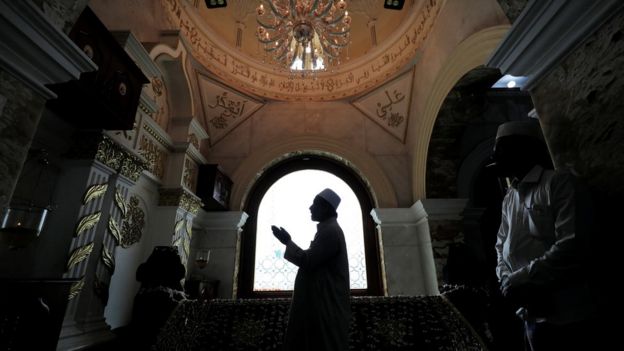 Image copyrightDINUKA LIYANAWATTEImage captionRituals associated with burial in Islam are designed to give the body dignity in death
Image copyrightDINUKA LIYANAWATTEImage captionRituals associated with burial in Islam are designed to give the body dignity in death
Dr Sugath Samaraweera, the government's chief epidemiologist, told the BBC it was government policy that all those who die from Covid-19, as well as those suspected of dying from it, are cremated, as burials could contaminate ground drinking water.
Dr Samaraweera said the government was following expert medical advice, and applying the rule to anyone suspected of dying from coronavirus, regardless of religion.
"The WHO offers guidelines for the whole world. It is our responsibility to adopt or customise those guidelines suitable to our country," he said.
But Muslim activists, community leaders and politicians have asked the Sri Lankan government to reconsider the decision.
Ali Zahir Moulana, a former minister and senior leader of the Sri Lanka Muslim Congress party, said the Muslim community was prepared to accept the rule "if there is evidence or scientific backing to prove that burial is dangerous to public health". But he questioned the science behind it, and accused the government of pursuing a "dark political agenda".
Interim guidance published by the WHO in March says victims of coronavirus "can be buried or cremated", and does not mention dangers to groundwater.
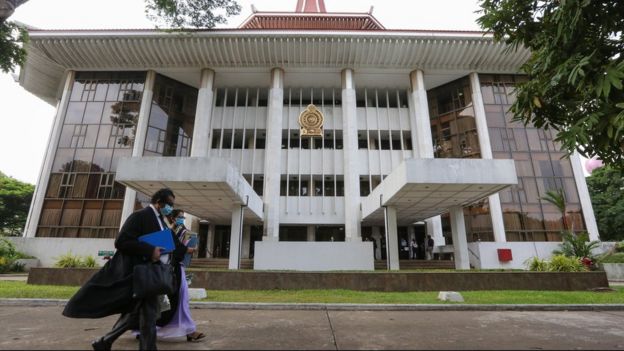 Image copyrightEPAImage captionA petition against the cremation rule has reached the country's Supreme Court
Image copyrightEPAImage captionA petition against the cremation rule has reached the country's Supreme Court
On the same day that Fathima died, 64-year-old Abdul Hameed Mohamed Rafaideen passed away at his sister's house in Colombo. The labourer and father of four had been suffering from breathing difficulties.
His youngest son, Naushad Rafaideen, told the BBC that a neighbour from the majority Sinhala community died the same day.
Because of lockdown travelling restrictions, local police asked the family to take the body of the neighbour, together with their father's body, to the hospital.
At the mortuary, the doctor told Naushad he was not allowed to touch his father's body because of the risks of Covid-19, even though it wasn't clear whether the virus was the cause of death.
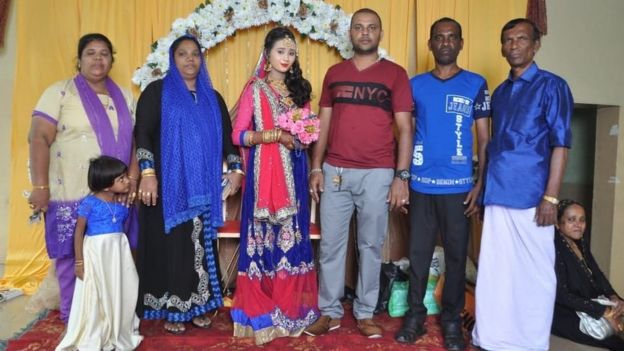 Image copyrightNAUSHAD RAFAIDEENImage captionHappier times in the Rafaideen family. Naushad is in the middle, and his father on the right
Image copyrightNAUSHAD RAFAIDEENImage captionHappier times in the Rafaideen family. Naushad is in the middle, and his father on the right
Naushad, who cannot read, was asked to sign some papers which gave permission for his father's body to be cremated.
He said he wasn't sure what would happen to him if he didn't sign, but he feared a backlash against his family and community if he refused. He said the Sinhalese family was treated differently, and allowed to pay respects to their relative at a funeral parlour, though the BBC could not independently verify this. Only Naushad and a handful of relatives were allowed to attend the cremation of his father, he said.
Meanwhile, nearly six weeks after the death of his wife, Shafeek is unsure whether she ever tested positive for coronavirus, and he is struggling to come to terms with not being able to bury her body. One thing he was sure of, he said. "We Muslims do not cremate our dead."
| < Prev | Next > |
|---|





